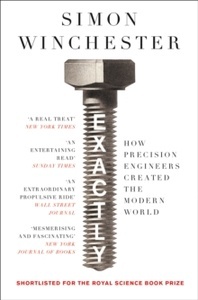Exactly
How Precision Engineers Created the Modern World

Editorial Harper Collins
Fecha de edición mayo 2019 · Edición nº 1
Idioma inglés
EAN 9780008241780
416 páginas
Libro
encuadernado en tapa blanda
Resumen del libro
SHORTLISTED FOR THE ROYAL SOCIETY SCIENCE BOOK PRIZE 2018 Bestselling author Simon Winchester writes a magnificent history of the pioneering engineers who developed precision machinery to allow us to see as far as the moon and as close as the Higgs boson. Precision is the key to everything. It is an integral, unchallenged and essential component of our modern social, mercantile, scientific, mechanical and intellectual landscapes.
The items we value in our daily lives - a camera, phone, computer, bicycle, car, a dishwasher perhaps - all sport components that fit together with precision and operate with near perfection. We also assume that the more precise a device the better it is. And yet whilst we live lives peppered and larded with precision, we are not, when we come to think about it, entirely sure what precision is, or what it means.
How and when did it begin to build the modern world? Simon Winchester seeks to answer these questions through stories of precision's pioneers. Exactlytakes us back to the origins of the Industrial Age, to Britain where he introduces the scientific minds that helped usher in modern production: John 'Iron-Mad' Wilkinson, Henry Maudslay, Joseph Bramah, Jesse Ramsden, and Joseph Whitworth. Thomas Jefferson exported their discoveries to the United States as manufacturing developed in the early twentieth century, with Britain's Henry Royce developing the Rolls Royce and Henry Ford mass producing cars, Hattori's Seiko and Leica lenses, to today's cutting-edge developments from Europe, Asia and North America.
As he introduces the minds and methods that have changed the modern world, Winchester explores fundamental questions. Why is precision important? What are the different tools we use to measure it? Who has invented and perfected it? Has the pursuit of the ultra-precise in so many facets of human life blinded us to other things of equal value, such as an appreciation for the age-old traditions of craftsmanship, art, and high culture? Are we missing something that reflects the world as it is, rather than the world as we think we would wish it to be? And can the precise and the natural co-exist in society?
Biografía del autor
Simon Winchester, OBE, a British writer, journalist and broadcaster, was born in north London on 28th September 1944.<br> After taking time off to hitch-hike around Canada and the United States for almost a year between leaving school and entering university, he went up to Oxford in 1963, to read geology at St. Catherine's College. There he became involved in the University Exploration Club, and was the member of a six-man sledding expedition onto an uncharted section of the East Greenland ice-cap in 1965.<br>In 1969 he joined The Guardian, first as the Newcastle upon Tyne-based regional correspondent and later as Northern Ireland Correspondent, based in Belfast. He remained in Ireland for the next three years during which time he was named Britain's Journalist of the Year, in 1971 and covered all of the major developments in the territory, from the British government's introduction of internment without trial of IRA suspects, through the events of Bloody Sunday in Londonderry in January 1972, to the British army crackdown during Operation Motorman. During this period he became a frequent commentator on and contributor to BBC radio.<br>In 1972 he was posted to Washington, DC, as America correspondent, and spent much of the following four years covering the Watergate affair, the resignation of President Nixon and the election to the White House of Jimmy Carter. It was also during this period that, on the urging of the noted Faber editor Charles Monteith (who edited the poet Philip Larkin and discovered William Golding's Lord of the Flies) Winchester wrote his first book, In Holy Terror, an account of his reporting years in Ireland.<br>He achieved some early and unintended notoriety in this post during the spring of 1982 when he managed both to be on the Falkland Islands when they were invaded by Argentine forces, and shortly afterwards to be captured in southern Patagonia, along with two other journalist working for the rival newspaper, the Observer, and held in prison in Tierra del Fuego, Argentina, for the following three months.<br><br>After his return to freedom in England in July 1982 Winchester continued to travel and write for the newspaper, but when a new editor was appointed in 1985 he changed his arrangements to that of freelance correspondent, and travelled by train, from London by way of Moscow, Irkutsk and Ulan Bator to take up a new assignment in Hong Kong.<br>He was to remain based in southern China, responsible for covering a vast territory stretching from Siberia to Tasmania, from Burma to Hawaii for the next twelve years, during which time he rejoined the Guardian and also accepted a freelance assignment as Asia Editor of the newly-established Conde Nast Traveler magazine, based in New York. His term with the Guardianthen came to an abrupt end when his supervising editor was found to have been taking gifts from the KGB, and was fired. Winchester remained in Hong Kong making as good a living as possible as a freelance writer, and then after the handover of the British colony to China in June 1997, went to live in New York.<br><br>It was here that his recent good fortune as an author began, with the publication in 1998 ofThe Professor and the Madman, a book about a forgotten American player in the extraordinary story of the making of the Oxford English Dictionary. Although his publishers had little initial hope for the book ordering an initial very modest print run of some 10,000 copies it happened that thanks to a convergence of happy circumstances the book went on to sell millions of copies, and remains in print today in both hardback and paperback twelve years after publication.








